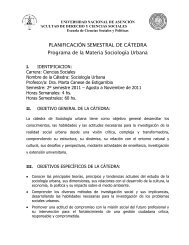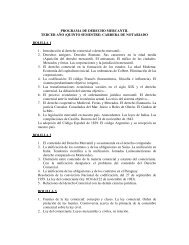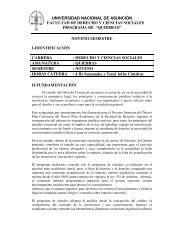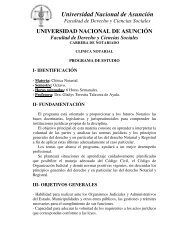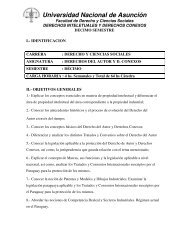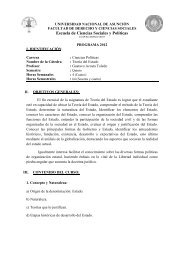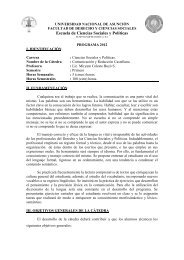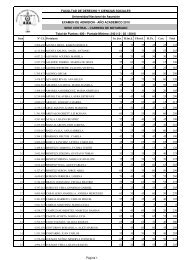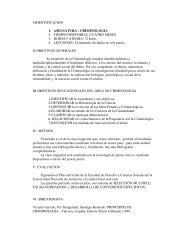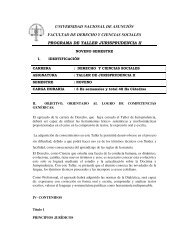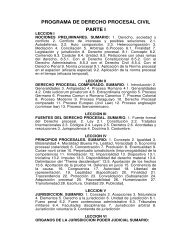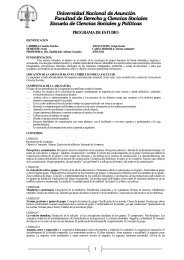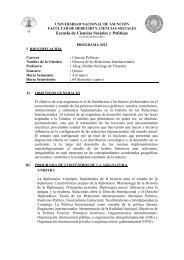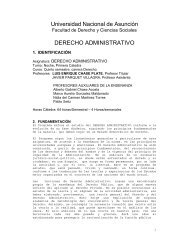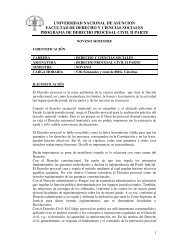Es propósito de la Criminología estudiar el fenómeno delictivo, a los ...
Es propósito de la Criminología estudiar el fenómeno delictivo, a los ...
Es propósito de la Criminología estudiar el fenómeno delictivo, a los ...
You also want an ePaper? Increase the reach of your titles
YUMPU automatically turns print PDFs into web optimized ePapers that Google loves.
III- CONTENIDO PROGRAMATICO<br />
PRIMERA PARTE – INTRODUCCION A LA CRIMINOLOGIA<br />
Ejes temáticos: Conceptos y Métodos <strong>de</strong> <strong>la</strong> Ciencia.<br />
LECCION I<br />
LA CRIMINOLOGIA. Etimología. Origen. Carácter. Objeto.<br />
Ciencias que <strong>la</strong> integran.<br />
Areas <strong>de</strong> estudio <strong>de</strong> <strong>la</strong> <strong>Criminología</strong>: El <strong>de</strong>lito. El <strong>de</strong>lincuente. La víctima. El control<br />
social.<br />
LA CRIMINOLOGIA Y EL DERECHO PENAL: Definición <strong>de</strong> DERECHO<br />
PENAL. Análisis <strong>de</strong> sus caracteres. Re<strong>la</strong>ciones entre <strong>el</strong> Derecho Penal y <strong>la</strong><br />
<strong>Criminología</strong>. Interdisciplinariedad.<br />
El pap<strong>el</strong> social <strong>de</strong>l Criminólogo.<br />
LECCION II<br />
METODOS DE LA CRIMINOLOGIA. Métodos <strong>de</strong> <strong>la</strong>s disciplinas naturales:<br />
Experimentación y Observación.<br />
LA OBSERVACION: CASOS INDIVIDUALES: a) Autobiografía <strong>de</strong>l <strong>de</strong>lincuente. b)<br />
Observador participante. c) Observación documental y observación directa d) Registro<br />
General <strong>de</strong> Activida<strong>de</strong>s..e) Entrevistas - encuestas<br />
Ventajas y <strong>de</strong>sventajas <strong>de</strong> cada uno <strong>de</strong> <strong>los</strong> métodos.<br />
Características.<br />
CASOS COLECTIVOS<br />
ESTADISTICA: Interpretación <strong>de</strong> datos. Ventajas y <strong>de</strong>sventajas.<br />
LA INVESTIGACION CRIMINALISTICA COMO METODO CIENTIFICO.<br />
Concepto <strong>de</strong> <strong>la</strong> Criminalística. Técnicas auxiliares <strong>de</strong> <strong>la</strong> Criminalística.<br />
SEGUNDA PARTE: PARADIGMAS CRIMINOLOGICOS<br />
Ejes temáticos: Teorías criminológicas antiguas y actuales. A<strong>de</strong>cuación a <strong>la</strong><br />
realidad <strong>de</strong>l Paraguay.<br />
LECCION III<br />
PARADIGMAS CRIMINOLOGICOS: Concepto. <strong>Es</strong>tudio <strong>de</strong> <strong>los</strong> siguientes:<br />
1- Paradigma <strong>de</strong>l Libre Albedrío. 2- Paradigma Científico. 3. Paradigma <strong>de</strong>l Conflicto<br />
Social.<br />
Teorías <strong>de</strong> cada uno <strong>de</strong> <strong>el</strong><strong>los</strong>: 1-Libre Albedrío: Teoría <strong>de</strong>l D<strong>el</strong>ito como Elección.<br />
2- Científico: Predisposiciones Agresivas- Diferencias Individuales- Influencias<br />
Sociales- Aprendizaje <strong>de</strong> <strong>la</strong> <strong>de</strong>lincuencia.<br />
3- Conflicto Social: La reacción y <strong>el</strong> conflicto social.<br />
LECCION IV<br />
PARADIGMA DEL LIBRE ALBEDRIO<br />
Teoría <strong>de</strong>l D<strong>el</strong>ito como Elección (Capítulo 1)<br />
Antece<strong>de</strong>ntes:<br />
Renovación iniciada por <strong>el</strong> italiano CESAR BONESANA, MARQUES DE<br />
BECCARIA en 1.764.<br />
Análisis <strong>de</strong> su obra “De <strong>los</strong> <strong>de</strong>litos y <strong>de</strong> <strong>la</strong>s penas”.<br />
Postu<strong>la</strong>dos <strong>de</strong>l Marqués <strong>de</strong> Beccaria.<br />
Jeremy Bentham.



